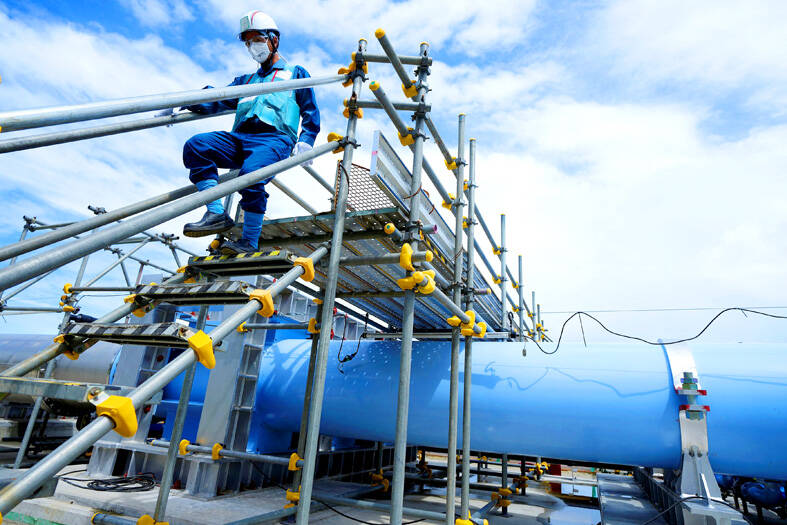Tokyo has urged Beijing to “ensure the safety of Japanese residents in China” after a wave of telephone harassment targeting businesses in Japan sparked by the controversial discharge of treated wastewater from the Fukushima Dai-ichi nuclear power plant.
While Japan says that the release of the treated water is safe — a view backed by the International Atomic Energy Agency — China has staunchly opposed it and banned all Japanese seafood imports, saying it contaminates the ocean.
The Japanese government yesterday published new data showing waters off Fukushima continued to post radioactivity levels well within safe limits.

Photo: Reuters
Calls from China began flooding Japanese businesses from Thursday, when Tokyo Electric Power Co Holdings (TEPCO) started releasing water used to cool the stricken nuclear reactors at Fukushima Daiichi nuclear plant.
Japanese businesses and groups, ranging from a concert hall in Tokyo to an aquarium in northern Iwate, reported that they had started receiving so many calls from Chinese speakers that they had difficulty conducting normal operations.
Japanese Asian and Oceanian Affairs Bureau Director-General Hiroyuki Namazu voiced his regret about the calls and told senior officials at the Chinese embassy in Tokyo to call for calm in China, the Japanese Ministry of Foreign Affairs said in a statement late on Saturday.
Similar incidents have also occurred in China against Japanese facilities, Namazu told Chinese embassy officials, the statement said.
“We strongly urge the Chinese government to take appropriate measures, such as calling on its citizens to act calmly, and to take all possible measures to ensure the safety of Japanese residents in China and Japanese diplomatic missions in China,” the statement quoted him as saying.
Tokyo’s embassy in Beijing has separately urged its nationals in China to refrain from speaking loudly in Japanese.
A Fukushima businessperson told Kyodo News that his four restaurants and pastry shops received about 1,000 calls on Friday, mostly from China.
His businesses had to unplug their phones, Kyodo said.
Fukushima Mayor Hiroshi Kohata on Saturday wrote on Facebook that the city hall had received about 200 similar calls in two days, while local schools, restaurants and hotels also became targets.
“I will report this to the Japanese government and demand action,” he wrote in his post.
The Japanese Ministry of the Environment yesterday said that a fresh test of Fukushima coastal water showed no elevated levels of tritium.
The ministry added that the water samples did not show signs of gamma radiation that can come from other radioactive materials such as caesium.
TEPCO is releasing more than 500 Olympic swimming pools’ worth of wastewater used to cool Fukushima’s damaged reactors, three of which went into meltdown in March 2011 when they were hit by a massive earthquake and tsunami.

Auckland rang in 2026 with a downtown fireworks display launched from New Zealand’s tallest structure, Sky Tower, making it the first major city to greet the new year at a celebration dampened by rain, while crowds in Taipei braved the elements to watch Taipei 101’s display. South Pacific countries are the first to bid farewell to 2025. Clocks struck midnight in Auckland, with a population of 1.7 million, 18 hours before the famous ball was to drop in New York’s Times Square. The five-minute display involved 3,500 fireworks launched from the 240m Sky Tower. Smaller community events were canceled across New Zealand’s

The Ministry of Foreign Affairs (MOFA) yesterday said it is closely monitoring developments in Venezuela, and would continue to cooperate with democratic allies and work together for regional and global security, stability, and prosperity. The remarks came after the US on Saturday launched a series of airstrikes in Venezuela and kidnapped Venezuelan President Nicolas Maduro, who was later flown to New York along with his wife. The pair face US charges related to drug trafficking and alleged cooperation with gangs designated as terrorist organizations. Maduro has denied the allegations. The ministry said that it is closely monitoring the political and economic situation

‘SLICING METHOD’: In the event of a blockade, the China Coast Guard would intercept Taiwanese ships while its navy would seek to deter foreign intervention China’s military drills around Taiwan this week signaled potential strategies to cut the nation off from energy supplies and foreign military assistance, a US think tank report said. The Chinese People’s Liberation Army (PLA) conducted what it called “Justice Mission 2025” exercises from Monday to Tuesday in five maritime zones and airspace around Taiwan, calling them a warning to “Taiwanese independence” forces. In a report released on Wednesday, the Institute for the Study of War said the exercises effectively simulated blocking shipping routes to major port cities, including Kaohsiung, Keelung and Hualien. Taiwan would be highly vulnerable under such a blockade, because it

UNRELENTING: China attempted cyberattacks on Taiwan’s critical infrastructure 2.63 million times per day last year, up from 1.23 million in 2023, the NSB said China’s cyberarmy has long engaged in cyberattacks against Taiwan’s critical infrastructure, employing diverse and evolving tactics, the National Security Bureau (NSB) said yesterday, adding that cyberattacks on critical energy infrastructure last year increased 10-fold compared with the previous year. The NSB yesterday released a report titled Analysis on China’s Cyber Threats to Taiwan’s Critical Infrastructure in 2025, outlining the number of cyberattacks, major tactics and hacker groups. Taiwan’s national intelligence community identified a large number of cybersecurity incidents last year, the bureau said in a statement. China’s cyberarmy last year launched an average of 2.63 million intrusion attempts per day targeting Taiwan’s critical